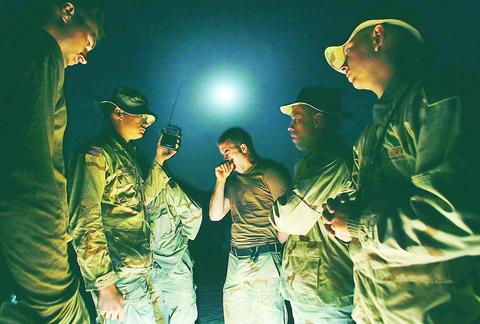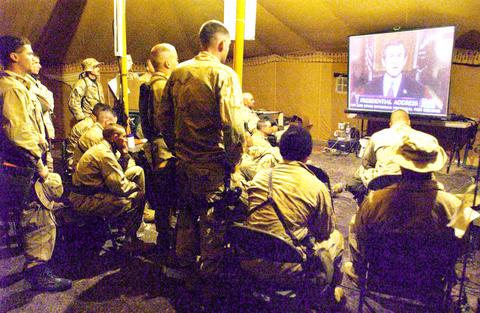In a countdown toward war, President George W. Bush is ready to order a massive military strike against Iraq if Saddam Hussein refuses to surrender power by a deadline of 1am GMT ( 9am Taiwan time) tomorrow. Wary of retaliation, Bush braced Americans for possible terrorist attacks.
Yesterday, Iraq's leadership rejected Bush's ultimatum. Iraqi television said the decision was made in a joint meeting of the Revolution Command Council -- Iraq's highest executive body -- and the leadership of the ruling Baath party. Saddam chaired the meeting, it said.
Bush, in a prime-time speech Monday night, vowed to strike Iraq with "the full force and might" of the US military unless Saddam and his two sons leave Iraq within 48 hours. More than 250,000 American forces are poised for action in the Gulf. "The tyrant will soon be gone," the president pledged

PHOTO: AP
Having abandoned diplomacy at the stubbornly divided UN Security Council, Bush set about trying to win over an equally divided American public. A CNN-USA Today-Gallup poll found Americans just about evenly split on whether the United States should unleash military action without a new UN vote. Forty-seven percent supported such an action and 50 percent opposed it.
In Geneva a group of international jurists said yesterday that any US-led attack on Iraq was illegal without UN Security Council backing.
"In the absence of such Security Council authorization, no country may use force against another country, except in self-defense against armed attack," the Geneva-based International Commission of Jurists (ICJ) said.

PHOTO: AFP
"This rule was enshrined in the United Nations Charter in 1946 for a good reason: to prevent states from using force as they felt so inclined," said ICJ Secretary-General Louise Doswald-Beck in a statement.
Washington and its main allies, Britain and Spain say resolution 1441, warning of "serious consequences" if Iraq did not disarm, give sufficient grounds.
But the ICJ, a group of 60 eminent international legal experts, said resolution 1441, approved last November, was not enough, particularly as three permanent members of the Security Council -- France, Russia and China -- issued a statement at the time spelling this out.
Indonesia, the world's most populous Muslim nation, lamented the breakdown of diplomacy, as did India, France and Mexico.
Japan supported the US position. "It was a decision that had to be made," Prime Minister Junichiro Koizumi said.
German Chancellor Gerhard Schroeder had the opposite view.
"Does the threat posed by the Iraqi dictator justify a war, which is sure to kill thousands of innocent children, women and men? My answer in this case was and is: No," Schroeder said.
French President Jacques Chirac said a war without the support of the UN would undermine future efforts at peaceful disarmament. France led an effort to give UN weapons inspectors in Iraq more time to uncover banned weapons.
"To act without the legitimacy of the UN, to favor the use of force over law, is taking a heavy responsibility," Chirac said.
At the Vatican, which is against war in Iraq, spokesman Joaquin Navarro-Valls said "whoever decides that all peaceful means available under international law are exhausted assumes a grave responsibility before God, his own conscience and history."
In Tokyo, Koizumi described the ultimatum as "a very difficult decision" for Bush and reiterated his government's position that there was no need for a new UN resolution authorizing an attack.
Japan's constitution bars its armed forces from fighting in foreign wars, but Koizumi's government reportedly was considering humanitarian missions.
China's new premier called for "every effort" to avoid a conflict and said that UN weapons inspections must continue even as he acknowledged that the situation appeared dire.
"The arrow has already been placed on the bow," said Wen Jiabao in a speech on his second full day as China's prime minister. "As long as there is one glimmer of hope, we will not give up our efforts for a peaceful settlement."
In Mexico City, President Vicente Fox said that he regrets that the conflict appears headed for war, but that his nation's opposition to military action would not strain relations with the US.
Mexico, a member of the UN Security Council, had struggled with its position on Iraq, as Fox walked a fine line between offending voters at home who overwhelmingly oppose war and antagonizing the US, which accounts for about 75 percent of Mexico's trade.
"We maintain our belief that the diplomatic means to achieving (the goal) have not been exhausted," Fox said.
In Indonesia, a government spokesman lamented the apparent breakdown of diplomacy. "We still believe that a solution to the crisis should be found within the UN Security Council," spokesman Marty Natalegawa said.
Outside Jakarta's main mosque an Islamic activist made a dire warning.
"Don't blame the Muslims if the coming war in Iraq gives birth to thousands of new Osama bin Ladens," said Habib Rizieq Shihab of the Islamic Defenders Front.
The countdown to war has raised the prospect of a backlash by Muslims in Indonesia and Malaysia, making it difficult to crack down on radical groups.
"I don't understand how someone can want war like Bush does," said Srisu Sapti, a maid in Jakarta. "Women and children will be killed."
In New Zealand, Prime Minister Helen Clark said it was "highly debatable" whether a US-led strike on Iraq would be justified under international law.
India issued a veiled criticism of US unilateralism, while Pakistan planned an emergency session of Parliament today to discuss Iraq.

INVESTIGATION: The case is the latest instance of a DPP figure being implicated in an espionage network accused of allegedly leaking information to Chinese intelligence Democratic Progressive Party (DPP) member Ho Jen-chieh (何仁傑) was detained and held incommunicado yesterday on suspicion of spying for China during his tenure as assistant to then-minister of foreign affairs Joseph Wu (吳釗燮). The Taipei District Prosecutors’ Office said Ho was implicated during its investigation into alleged spying activities by former Presidential Office consultant Wu Shang-yu (吳尚雨). Prosecutors said there is reason to believe Ho breached the National Security Act (國家安全法) by leaking classified Ministry of Foreign Affairs information to Chinese intelligence. Following interrogation, prosecutors petitioned the Taipei District Court to detain Ho, citing concerns over potential collusion or tampering of evidence. The

‘FORM OF PROTEST’: The German Institute Taipei said it was ‘shocked’ to see Nazi symbolism used in connection with political aims as it condemned the incident Sung Chien-liang (宋建樑), who led efforts to recall Democratic Progressive Party (DPP) Legislator Lee Kun-cheng (李坤城), was released on bail of NT$80,000 yesterday amid an outcry over a Nazi armband he wore to questioning the night before. Sung arrived at the New Taipei City District Prosecutors’ Office for questioning in a recall petition forgery case on Tuesday night wearing a red armband bearing a swastika, carrying a copy of Adolf Hitler’s Mein Kampf and giving a Nazi salute. Sung left the building at 1:15am without the armband and apparently covering the book with a coat. This is a serious international scandal and Chinese

Seventy percent of middle and elementary schools now conduct English classes entirely in English, the Ministry of Education said, as it encourages schools nationwide to adopt this practice Minister of Education (MOE) Cheng Ying-yao (鄭英耀) is scheduled to present a report on the government’s bilingual education policy to the Legislative Yuan’s Education and Culture Committee today. The report would outline strategies aimed at expanding access to education, reducing regional disparities and improving talent cultivation. Implementation of bilingual education policies has varied across local governments, occasionally drawing public criticism. For example, some schools have required teachers of non-English subjects to pass English proficiency

TRADE: The premier pledged safeguards on ‘Made in Taiwan’ labeling, anti-dumping measures and stricter export controls to strengthen its position in trade talks Products labeled “made in Taiwan” must be genuinely made in Taiwan, Premier Cho Jung-tai (卓榮泰) said yesterday, vowing to enforce strict safeguards against “origin laundering” and initiate anti-dumping investigations to prevent China dumping its products in Taiwan. Cho made the remarks in a discussion session with representatives from industries in Kaohsiung. In response to the US government’s recent announcement of “reciprocal” tariffs on its trading partners, President William Lai (賴清德) and Cho last week began a series of consultations with industry leaders nationwide to gather feedback and address concerns. Taiwanese and US officials held a videoconference on Friday evening to discuss the